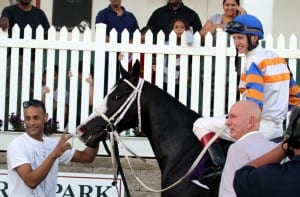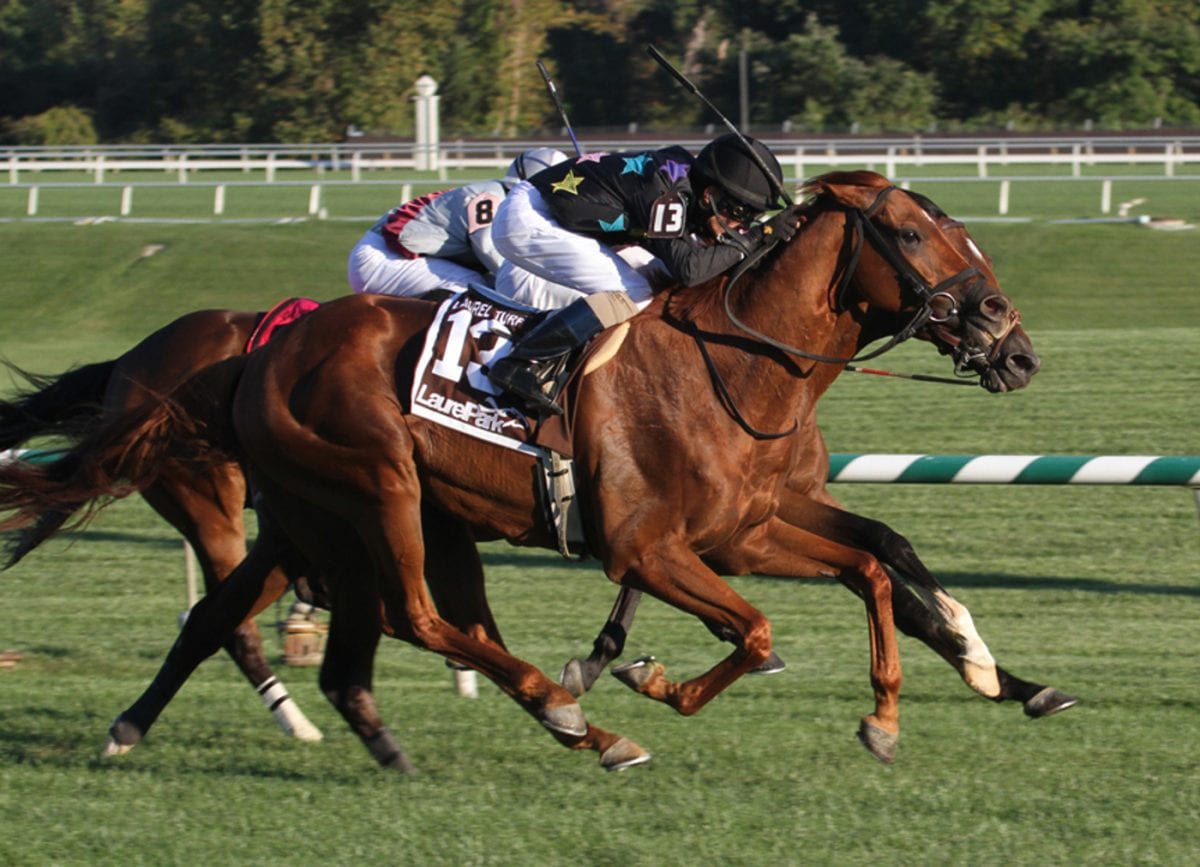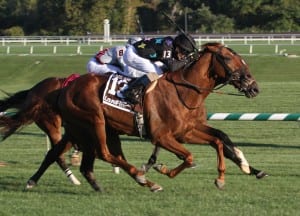by Frank Vespe
The last two of Laurel Park’s six stakes on Saturday were more or less opposites: the first, the Laurel Turf Cup, a 1 1/2 mile marathon that had one wag wondering whether it was 1978 all over again, the latter, the Laurel Dash, a six-furlong sprint on the grass, the kind of race that grows more popular with each passing year.
And at first blush, the Laurel stakes winners seemed to follow suit: Turf Cup winner Manchurian High’s trainer, young Lilli Kurtinecz, is working to establish herself as a flat trainer, while Bruce Alexander, who trained Dash champ Dreamsgonewild, is a veteran whose training career began in 1977 and whose horses have earned more than $11 million.
But dig a little deeper, and the two victories bear more than a passing resemblance.
Start with the horses.
A year ago, Manchurian High was toiling in the claiming ranks with trainer J.B. Secor, finishing his 2013 season by finishing second and third in a pair of $20,000 claimers. At that point, he’d lost 10 consecutive races and hadn’t won since early 2011.
“J.B. sold me the horse this winter,” Kurtinecz, who tried to make a go of it in the jumping world before returning to flat racing, said. “He was going to be a jumper, but his flat form came back to life.”
Indeed. Manchurian High won in his first start for Kurtinecz, taking an optional claimer at Pimlico. From there, she tried him in the Grade 1 United Nations. Though he finished last, he was beaten just five lengths — a result that looks better and better now that winner Main Sequence has won three straight Grade 1 events.
“He’s a trier — he tries regardless,” said the trainer, who trains on a Baltimore County farm.
“I would have thought at the beginning of the year that he was probably a $25,000 claimer,” Alexander said. “He’s risen to the occasion, that’s all there is to it.”
His win — over odds-on favorite and local hero Ben’s Cat — was his first in stakes company and marked him as something entirely different than a $25,000 claimer. But Alexander had already figured that out about a horse who has now won three straight races.
“[If he had run in a New York optional claimer that Alexander also considered] I would have had to run for the $62,500 tag, and where that would have looked like a lot of money before, I guess it’s not anymore,” he said.
To some extent, the horses’ wins came as validation of what their trainers believed they had in them; but to some extent, the wins came as quite a surprise.
“He’s smart, he’s amazing,” Kurtinecz said of Manchurian High, who rallied from the rear to win narrowly over Calvados and St. Albans Boy. “He’s been different going into each race completely.”
Kurtinecz, who called Manchurian High “my pet,” said that she had to tack the horse up before shipping “so he thinks he’s going somewhere to school or to play.” She said she got on the horse’s back and jumped him in the morning so that, when she bathed him before shipping, he wouldn’t “think something is happening.”

Dreamsgonewild upsets the Laurel Dash, and trainer Bruce Alexander, at right, beams. Photo by Laurie Asseo.
Alexander, meanwhile,struggled to explain the win.
“I’m at a loss for words — this was a real horse today,” he said. “The whole field was good, but Ben’s Cat is a special, special horse.”
“I think he’s the kind of horse that — good athletes, whether they’re equine or human, they rise to the level of their competition,” he assayed of his own runner.
For Kurtinecz, who trained on her own in 2011 and 2012 before trying the jumping world, it was her first-ever stakes victory, and she accepted a hug from an outrider while her beaming parents, who own half of Manchurian High, looked on. Her small barn has made nine starts this year, and Manchurian High’s two wins are her only two in 2014.
Likewise, Alexander has just four horses in his care, and Dreamsgonewild has registered all three of his barn’s 2014 victories.
For both horses, and both humans, the future will arrive soon enough. But neither was in much of a hurry to leave the winner’s circle Saturday; the present felt plenty good enough.









